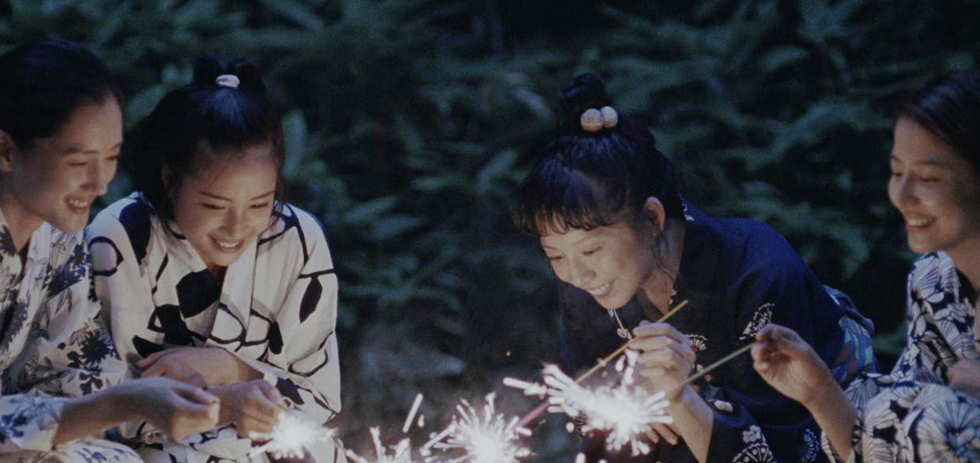
In 2004, with Nobody Knows, Hirokazu Koreeda redefined himself as a filmmaker explicitly concerned with ideas of an under pressure and altered family structures in Japan. Bar a few exceptions (Air Doll, Hana) these themes have sat at the centre of Koreeda’s works over the last decade; with the director oscillating between insightful dramas filmed with a rare precision, to more overly melodramatic pieces lacking a certain coherency. In Our Little Sister, Koreeda has released one of his strongest works to date, in a film that deals with trauma, relationships and tragedy; carefully balancing itself between Koreeda’s trademark emotive style with a well-written and performed set of characters that put this unconventional family drama amongst the director’s best.
Our Little Sister follows in the trend of Koreeda’s style of slow, lengthy filmmaking, running at over two hours with a heavily restrained plot. The film centres around three sisters who live in the seaside town of Kamakura, who visit mountainous Yamagata for the funeral of their estranged father – whom they haven’t seen in 18 years. They return with Suzu – their youngest sister -, whom their father had with his second wife and decides she wants a change of scenery. This makes Our Little Sister the director’s fourth film to focus specifically on abandoned children. However, Koreeda’s use of inverted story lines, a complex interplay between the two characters, and a phenomenal cast in the broader landscape of the the film give a certain depth to the piece that Like Father, Like Son failed immensely in developing. This is a Koreeda drama in a the vein of I Wish, a work that garners emotional responses through subtle performances and a slow-flowing (but consistently naturally moving) narrative.
The characters in Our Little Sister – not simply just the women, but this aforementioned supporting cast as well – give the film a rare universality imbued within a dictum of anti-exceptionalism. The oldest sister is the mature and professional Sachi, whose conservative social predilections and ambitions often restrict her extensive intellect and skill. A stark contrast is cut in Chiko, who works in a general sports store and is fascinated with climbing and the outdoors. In the middle sits Yoshi, who works in a bank – and is poorly characterised through excessive sexualisation 1 as the “comfortably single” one in the group. Introduced as the youngest, the previously mentioned Suzu brings a refreshing characters in Koreeda’s recent films – overtly portrayed as mature, inquisitive yet uncertain, providing much of the films existential development through the constant questioning raised through her particularly unique situation: leaving her birthplace at 15 to move in with three sisters she’s never met before in her life.
Koreeda has often been compared to Ozu Yasujiro (despite preferring comparisons to Mizoguchi Kenji and Ken Loach) and his latest film does little to brush off these criticisms. This micro-scale drama that preferences interpersonal connection over narrative ambition is cemented in Koreeda’s latest work 2 with all four sisters developed as highly distinguished characters whose interactions between one another promulgate the majority of interest throughout the film. The focus on female characters in the past for Koreeda hasn’t always worked for the director. Air Doll, for one, relied on objectifying its lead in the name of ‘characterisation’ and drove the film into the ground as a result. While Koreeda’s tendencies in this vein are still, albeit rarely, on display in Our Little Sister – the film’s presentation of female characters has far more in common with Maborosi 3 with a female cast giving the film the majority of its character.
Hirokazu Koreeda’s film looks as beautiful as anything else he’s put together. While this is always an expectation with one of Japan’s most successful filmmakers, it isn’t ever as guaranteed that the aesthetic side is going to match up with a strong cast, narrative and coherent structure. Our Little Sister is a film that studies the support that sisters can provide for one another. In the organic character development, the evasion of ‘big stories’ in preference of a unique intimacy, and Hirokazu Koreeda’s intricacy in weaving his strengths into a coherent film – carefully taking note not to include any of the threads that have brought down his films in the past -, the filmmaker has created one of his most wholesome works. All in all, Our Little Sister is a return to form for one of Japan’s most prominent modern directors.
